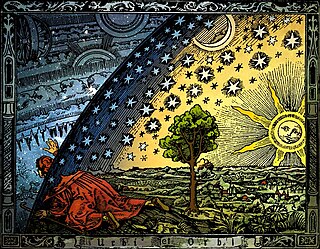آسترولوژی
آسترولوژی، گؤی جیسملرینین و آسترونومیک فنومنلرین، اینسان کاراکتری و قدری اۆزهرینه تأثیرلرینین اوْلدوغونو ایدیعا ائدن و بیلیمسل بیر دایاناغا صاحیب اوْلمایان سؤزده بیلیم دیر. آسترولوژی سؤزلوگۆ یونانجا، اولدوز آنلامؽنا گلن 'astro' و بیلگی آنلامؽنا گلن 'logos' کلمهلریندن اۆرهتیلمیشدیر.

آسترولوژی، اینسانلارا گلهجکده یاشاناجاق اوْلایلاردان خبردار ائدهبیلهجگینی ایدیعا ائدر فقط بو ایدیعالاری کسین دلیللره دایاندیریلماماسیندان اؤترو آسترولوژی بیر سؤزده بیلیم دیر.[۱][۲][۳] اسکیدن آسترولوقلار گؤی گونلوگو آدی وئریلن و گؤی اۆزو قوْنومونون گون، آی و ایل اوْلاراق گؤسترن بیر کیتاب و ائو تابلولاری ایستیفاده ائدرک اولدوز خریطهسی قرافیکینی چیخارتیرلاردی. بۇنلارین دوْغرولوغو آسترولوژینین دیگر ایدیعالاری ایله بیرلیکده بیلیمسل ادبیاتدا کئچرلی دئییلدیر.[۳] تام بۇنلارا رغماً آسترولوژی، حالا توم دۆنیادا طرفدارلارینی سۆردورمکدهدیر.
آیریجا باخ
دَییشدیرقایناقلار
دَییشدیر- ^ Zarka, P. (2009). Astronomy and astrology. Proceedings of the International Astronomical Union, 5(S260), 420-425. doi:10.1017/S1743921311002602
- ^ Carroll, Robert Todd (2003). The skeptic's dictionary : a collection of strange beliefs, amusing deceptions, and dangerous delusions. Hoboken, NJ: Wiley. ISBN 978-0-471-27242-7.
- ^ ۳٫۰ ۳٫۱ Allum, Nick (13 December 2010). "What Makes Some People Think Astrology Is Scientific?". Science Communication. 33 (3): 341–366. CiteSeerX 10.1.1.598.6954. doi:10.1177/1075547010389819. S2CID 53334767. This underlies the "Barnum effect". Named after the 19th-century showman Phineas T. Barnum, whose circus act provided "a little something for everyone", it refers to the idea that people believe a statement about their personality that is vague or trivial if they think that it derives from some systematic procedure tailored especially for them (Dickson & Kelly, 1985; Furnham & Schofield, 1987; Rogers & Soule, 2009; Wyman & Vyse, 2008). For example, the more birth detail is used in an astrological prediction or horoscope, the more credulous people tend to be (Furnham, 1991). However, confirmation bias means that people do not tend to pay attention to other information that might disconfirm the credibility of the predictions.